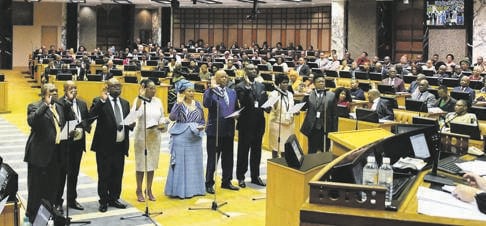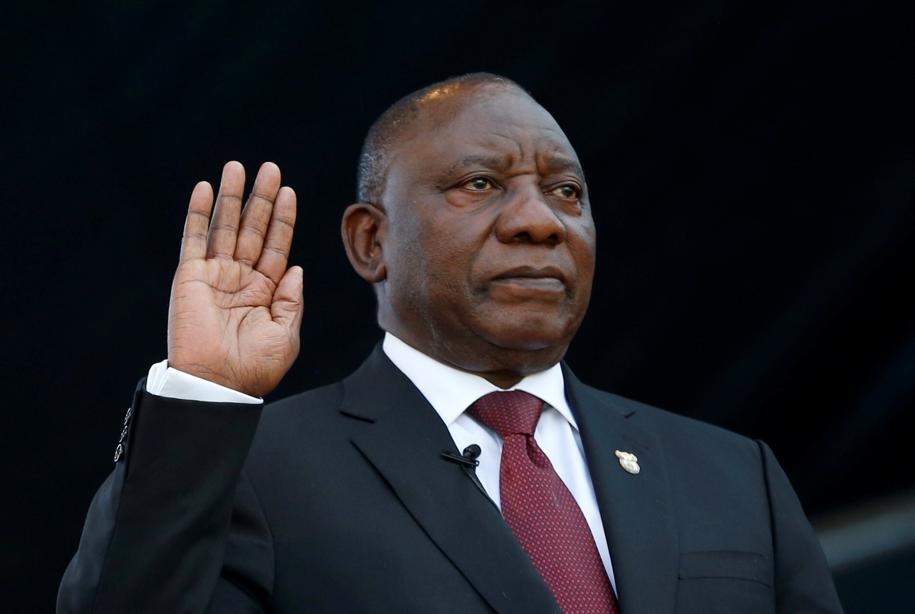
At his inauguration as our country’s president, Cyril Ramaphosa declared: “Today is the choice of history. It is a time to make the future we yearn for. It is through our actions now that we will determine our destiny. South Africans want action and not just words and promises.”
He further stated: “They yearn for a society in which our worth is determined by how we value others … It is our shared will – and our shared responsibility – to build a society that knows neither privilege nor disadvantage.”
He encouraged the citizenry to commit to build “a society that values excellence, rewards effort and hard work, and rejects mediocrity”.
The president concluded by reiterating the symbolic essence of the Thuma Mina slogan used by the ANC during electioneering, intimating that it was evolutionary and had life beyond the election phase. Therein lies a daunting challenge for the 490 people sworn in as members of the sixth Parliament of the republic.
The swearing-in symbolism goes deeper than the buoyancy communicated through social media circuits. It is about the honour, servitude and commitment to serve the country.
Of which Ramaphosa said: “You have chosen them to safeguard your rights, to improve your lives and to build a country that is united, strong and truly free … A new era has dawned in our country.”
The essence of what the president articulated during his inauguration and the swearing-in of new members of Parliament finds expression in the words of the American educationalist William Ayers: “In a democracy, [selected members] must be models of thoughtfulness and care; exemplars of problem-solving and decision making.”
Notwithstanding the varied experience of the designated ministers and deputies, it is not certain that they are steeped in knowledge of their assigned portfolios and professionally effective; apart from “sanitised” party lists and, to some extent, notable performance records by those who held official positions before. Of course, alliance partnership trade-offs paved the way.
Previous selections were subjected to similar processes. How different, then, will the sixth Parliament be from previous ones?
The notion of hope dominated the president’s speech. Should we continuously invest in hope? Twenty-five years ago, we had that effervescent hope that our socioeconomic conditions would improve. Batho Pele became a slogan for service delivery. Somehow, the governance machinery stuttered, creating a dysfunctional environment for effective service delivery, characterised by protests about it.
Ramaphosa referred to: “These 490 men and women whom you have sent to Parliament seem to have heard the same call the Lord made to Isaiah when He said: ‘Whom shall I send, and who will go for us?’” He concluded: “They have now said, send us. They have said thuma thina!” Will the new team deliver? Only time shall tell.
Given the litany of unsavoury narratives about the country’s state of governance during the fifth Parliament, a more circumspect approach is called for. Mzansi’s prolific authors have captured the moments of unaccountable rapacity of the state, for instance: We have now begun our descent – How to stop South Africa losing its way (Justice Malala); How to Steal a Country (Robin Renwick); The President’s Keepers (Jacques Pauw); and The Republic of Gupta (Pieter-Louis Myburgh), to name but a few.
Cumulatively, this genre portrays a nation and country dislodged from the axis of good governance, accountability and meritocracy. Can the new dawn declared by the president arrest the abrasive rapacity and culture of unaccountability from spiralling into that sordid heritage we do not want to bequeath to the next generation? Building functional governance machinery can be likened to creating national herbaria or botanical gardens to preserve plants and record their DNA for public access and research. Maintaining this level of efficacy helps governments keep their equilibrium.
For 25 years, it has not all been doom and gloom; some spheres of governance have done well under difficult conditions. For instance, the judiciary has demonstrated independence in the way it has dealt with some prominent cases, while continuing commissions of inquiry give the public some confidence in the national legal services. Commissions of inquiry are not a panacea for societal ills, but they reveal underlying systemic fissures, for instance, the financial debauchery of state-owned enterprises and government departments happening under designated stewardships. Failure to manage these structures well has given rise to that infamous fiscus heritage – the bail-out syndrome that threatens to commit the country to “junk” status.
President Ramaphosa stated that new performance agreements would be signed by the “new dawn” team. Previously, such agreements were signed, yet some sections of governance continued to underperform. How would the new agreements differ from those of the past? Could the new dawn be a euphemism for lapses in governance and leadership? The devil is in the detail, to give the public that much-needed confidence in the manner in which government manages performance.
Ramaphosa said: “I am humbled by the trust you have bestowed upon me, aware of the challenges our country faces, but also alive to the fact that our people are filled with hope for a better tomorrow.”
While one assumes that he understands the enormity of his tenure and the effort and expertise required to deliver on this significant national contract, could the same be said about his team of ministers, deputies and general civil service personnel? Only time shall tell.
I recall conversations with my late aunt, Ntibi – a consummate indigenous healer and custodian of indigenous knowledge systems about plants and their medicinal use. She intimated that their profession was anchored on knowledge, integrity and ethical practices. She picked up one plant and said: “This herb can induce a coma if misused.” I swore never to experiment with it, in spite of my proximity to it as a herd boy. It turned out she was referring to conium – commonly known as hemlock. It is considered extremely toxic with alkaloids, and reckless consumption leads to paralysis, including cardiac arrest. Yet it can treat epilepsy, spasms and tumours, and has other medically validated uses.
Nature mimics humanity in many ways. Poor relational experiences with nature upset biodiversity equilibrium. Similarly, when those in governance fail to maintain systemic efficiency, it unbalances service delivery. When Ramaphosa chose ministers and deputies, he was creating governance herbaria that represent the diversity of the national roles departments perform. Managing governance requires astute stewardship that understands the scope of sectors and requisite ways to keep them effective for service delivery.
Will the work culture of the elected thuma thina stewardship deliver on what the president promised in his inauguration speech or will it be as toxic, as reckless, as the misuse of hemlock? We have been on that road before. The SA Social Security Agency and Life Esidimeni debacles happened on the watch of the fifth Parliament. Will history repeat itself?
Since Ramaphosa said we should “let our gaze stretch beyond the horizon” and restore our country’s integrity, rule of law and service delivery efficacy, perhaps those entrusted with the stewardship of the departments can use Robert Louis Stevenson’s wise words as a reminder for the trust bestowed on them: “A birdie with a yellow bill/ Hopped upon my window sill/ Cocked his shinning eye and said:/ ‘Ain’t you ’shamed, you sleepy-head!”
Monyooe is a concerned citizen
TALK TO US
Are you encouraged by President Ramaphosa’s selection of ministers and their potential?
SMS us on 35697 using the keyword THUMA and tell us what you think. Please include your name and province. SMSes cost R1.50. By participating, you agree to receive occasional marketing materia




 Publications
Publications
 Partners
Partners









